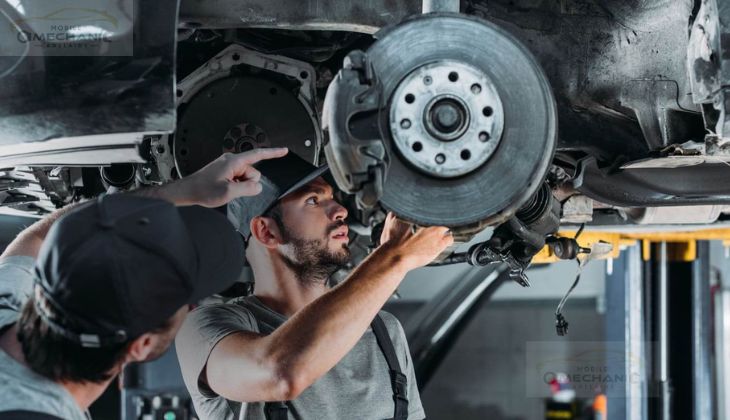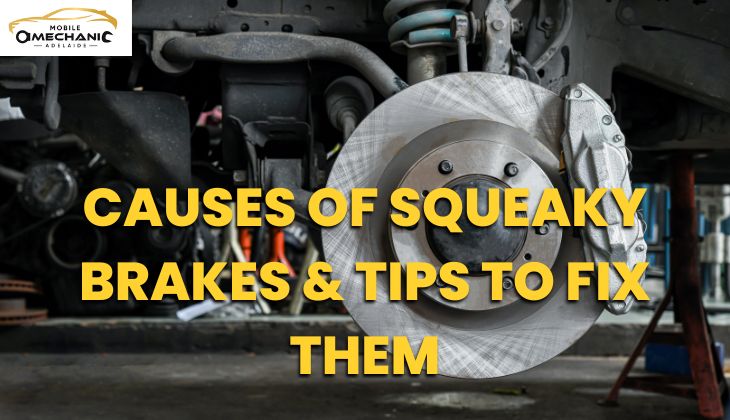The average cost to repair a car brake can vary depending on the extent of the damage and the type of repair needed. It’s always best to get a quote from a trusted mobile brake service near you or a reputable automotive mobile mechanic in Adelaide to ensure you’re getting a fair price for your brake repairs.
One of the most significant benefits of using the best brake specialist in Adelaide
is the convenience and flexibility they offer. Rather than taking your vehicle to a traditional mechanic, a mobile brake technician can come to you and perform the necessary repairs at your home or workplace, saving you time and hassle. Additionally, a reputable mobile Brake repair specialist in Adelaide will offer expert advice on the best brake maintenance practices and provide quality service to keep your brakes in top condition.
Car brake squeaking is an issue drivers face as their vehicles age. Choose the replacement parts and tools for the job, and using the best mobile mechanic car service can make this process easier and more efficient.
Some causes of Squeaky Brakes
If you notice any unusual noises or changes in brake performance, it’s necessary to get your brakes inspected by a professional mechanic. Regular brake maintenance and inspections can help prevent these issues from occurring in the first place. If you notice your brakes making a squeaking noise, it can be a sign that they need maintenance. The noise is often caused by worn brake pads that should be replaced.
1. Issues with Brake Pads
The most common cause of brake squeaking is worn-down brake pads. When your brake pads become too thin, they can start to make a high-pitched squeaking sound when they come into contact with the brake rotor. This is because the brake pad wear indicator, designed to make noise when the pads get too thin, is rubbing against the rotor.
Another issue with brake pads that can cause squeaking is the composition itself. Some types of brake pads, such as metallic and ceramic options, produce more noise than others. If you’re experiencing excessive brake noise, consider switching to a different type of brake pad.
2. Problems with Brake Rotors
Brake rotors can also be a source of brake noise. When brake rotors become warped or unevenly worn, they can cause the brake pads to vibrate against them, resulting in a squeaking or squealing noise. Over time, this can lead to further damage to your brake system, which can be costly to repair.
3. Issues with Brake Calipers
In some cases, brake calipers can be the cause of brake noise. If the caliper is sticking or not releasing appropriately, it can cause the brake pads to reach the rotor even when the brakes are not applied. This can lead to a persistent squeaking noise that can be difficult to diagnose and fix without professional help.
4. Metallic brake pads
While metallic pads have benefits, such as being more durable and long-lasting, they can also be noisier than others. Metallic pads are made with tougher materials which can create more friction when braking, leading to the squealing noise that many drivers are familiar with.
5. Braking style
When it comes to driving habits, one of the issues that may arise is squeaky brakes. This is not only annoying, but it may also indicate a need for maintenance. Your braking style can have a significant impact on the lifespan of your brakes and also affect their overall performance. Excessive braking can cause your brakes to wear out faster, which may lead to squeaking or grinding sounds.
6. Environmental Factors
Finally, it’s worth noting that environmental factors can also play a role in brake noise. For example, high humidity can cause a thin layer of rust on the rotor, resulting in a squeaking noise. Similarly, if you frequently drive on dirt roads or in areas with lots of sand and gravel, you may find that your brakes start to make more noise than usual.
Tips to Fix Squeaky Brakes

If you’ve determined that the cause of your squeaky brakes is due to worn-out brake pads, it may be time to replace your brake pads. Here’s a step-by-step guide to fixing your squeaky brakes:
A. Gather the Necessary Tools and Materials
You’ll need a jack stand, lug wrench, socket set, and a new set of brake pads compatible with your vehicle.
B. Remove the Old Brake Pads
Use your jack stand to lift your vehicle and remove the wheel. Use the lug wrench to remove the lug nuts and the tire. Locate the brake caliper and remove the retaining clips or bolts that hold it in place. Pull the caliper away from the rotor and remove the old brake pads.
C. Install the New Brake Pads
Insert the new brake pads into the caliper and reattach the retaining clips or bolts. Ensure that the pads are seated within the caliper. Slide the caliper back onto the rotor and reattach the retaining clips or bolts.
D. Reinstall the Wheel and Lower Your Vehicle
Replace the tire and lug nuts onto the wheel and tighten them. Use your jack stand to lower your vehicle back down to the ground.
Repeat these steps for the remaining wheels that need new brake pads. Use the Car mechanic mobile service available in your area to help you with your car maintenance.
How to Prevent Squeaky Brakes
Preventing squeaky brakes is an essential part of brake maintenance and can help prolong the life of your brakes, ensuring optimal performance. Here are some tips for controlling squeaky brakes:
- Brake dust and debris can build up on your brakes over time, making brake noise. To prevent this, it’s essential to clean your brakes regularly. You can use a brake cleaning solution to clean the brake pads, rotors, and calipers. This will help remove any dirt or debris causing your brakes to squeak.
- The quality of your brake pads can also play a significant role in preventing squeaky brakes. High-quality brake pads are less likely to produce noise and will provide better performance. When selecting new brake pads, it’s essential to choose a reputable brand and ensure that they are compatible with your vehicle.
- Regular brake inspections can help identify any issues with your brakes before they escalate. This can include problems like worn brake pads, uneven wear, and brake fluid leaks.
- Finding the best brake specialist in Adelaide is critical for ensuring long-term health and performance. A trusted brake specialist can provide expert advice on brake maintenance and repairs and offer mobile brake services for added convenience. By finding a reliable brake specialist, you can have peace of mind knowing that your brakes are in good hands.
Read Also: A Definitive Guide to Car Brakes
Conclusion
Regular brake maintenance and repair services are crucial for safe and reliable vehicle performance. Always be aware of the signs that your brakes may need attention, including reduced stopping power and grinding noises. According to experts, squeaking brakes should never be ignored. They are a sign that something is wrong with your brake system.
Brake safety is crucial for your security and everyone else on the road. A car with faulty brakes can pose a significant danger and lead to accidents, injury, or even fatalities.
Regular brake inspections and maintenance can help you identify and fix potential brake problems before they become more severe and expensive. It’s advisable to seek the services of a professional brake specialist who can diagnose and repair your brake system, ensuring your safety and peace of mind while on the road.
